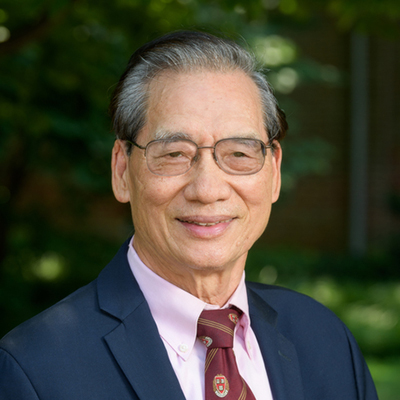Chin-Pao “C.P.” Huang

Email: huang@udel.edu
Chin-Pao “C.P.” Huang
EDUCATION
Master | Harvard University
Bachelor | National Taiwan University
Executive Summary
C. P. Huang is a Donald C. Phillips Professor and Francis Alison Professor in the Department of Civil and Environmental Engineering. He completed a BS in Civil Engineering from National Taiwan University, Taiwan (1965) and MS in Environmental Engineering (1967) and Ph.D. in Aquatic Chemistry (1971) from Harvard University, Cambridge, MA. He was an Assistant Professor of Civil Engineering at Wayne State University, Detroit, MI from 1971-1974 before joining the University of Delaware as an Assistant Professor in Fall of 1974. He was promoted to Associate Professor in 1977 and Full Professor in 1981. He was awarded the Distinguished Professor in 1992, Donald C. Phillips Professor in 2002, and Francis Alison Professor in 2009. He also served as the Department Chair from 1996-2001. Prof. Huang has been appointed Honorary Distinguished Professor by several national universities in Taiwan, including National Taiwan University, National Chiao Tung University, and National Chung Hsing University.
Prof. Huang’s research interest is in principles and applications of aqueous chemistry at the solid water interfaces. His early work deal with ion adsorption onto hydrous solids including metal oxides, clay minerals, aluminosilicates, flyash, biomass, and activated carbon aiming at the removal of hazardous metals from water. He is one of the early researchers to study advanced oxidation technologies, namely, Fenton reagent and heterogeneous photocatalysis, for the removal of hazardous chemicals from water. His recent research activities focus on environmental nanotechnology and environmental electrochemical technology aiming at understanding the mechanisms of adsorption and transformation of hazardous chemicals on nanocatalsts. The overall goal is to understand the effect of crystal facets and defects on the reactivity and selectivity of hazardous chemicals such as pharmaceuticals and micronutrients over nanocatalysts driven by photo energy and electricity. His work on the transport and effects of engineered nanoparticles on ecological systems is among the early investigations in the field.
Prof. Huang has received numeral honors and awards: Lifetime Achievement Award of Chinese-American Professors of Environmental Engineering and Science (2017); Distinguished Lifetime Achievement Award, Chinese Institute of Engineering-USA (2017); Distinguished Service Award, Chinese-American Professors of Environmental Engineering and Science (2014); Top 25 most cited publications, Applied Catalysis, B. Environment (2011); Gordon Maskew Fair Award, American Academy of Environmental Engineers (2012); Graduate Advising and Mentoring Award, University of Delaware (2008); Wesley H. Horner Award, ASCE (2008); Best Theoretical Paper Award, World Water and Environmental Resources Congress, ASCE (2005); Gordon Maskew Fair Medal, Water Environment Federation (1999); Gold Medal, Life-time Achievements in Research, Chinese Institute of Environmental Engineering (1995); Outstanding Researcher of the Year Award, Overseas Chinese Environmental Engineers and Scientists Association (1994); Author of “Citation Classics” (1994). Special Issue on “Environmental Nanotechnology and Sustainability in Water Treatment” by J. Separation and Purification Technology, Elsevier Publishing (2015) and Special Issue on “Advances in Research and Development of Sustainable Environmental Technology” by J. Environmental Engineering, ASCE (2012), 138(3), were published in honor of Prof. Huang for his contributions in environmental physical chemical processes research. A Symposium on “Thermodynamics and Kinetics of Treatment Processes” sponsored by the Division of Environmental Chemistry, ACS, August 10-14, San Francisco, CA, 2014 was organized in honor of Prof. Huang for his life-time contributions to research in equilibrium and kinetics of chemical processes.
Research Areas
- Environmental and Water Resources
- Sustainability
- Water
